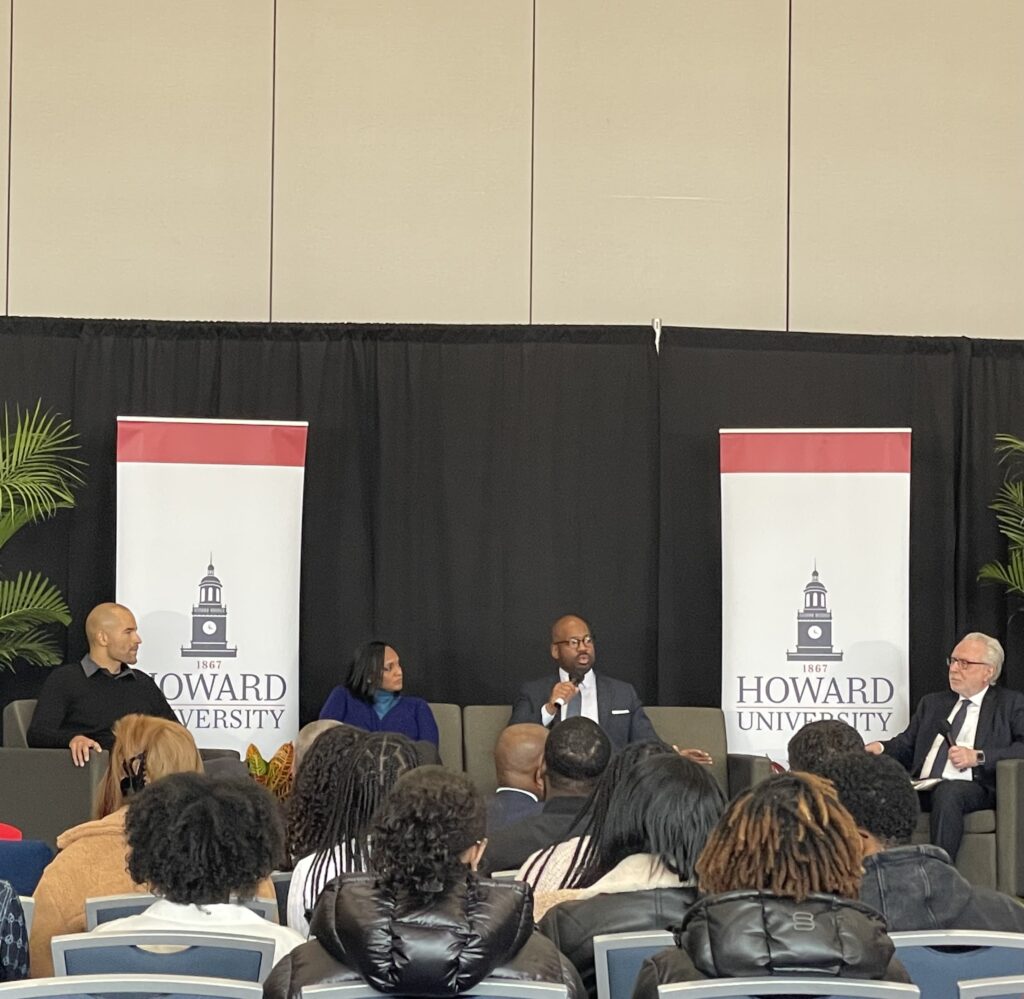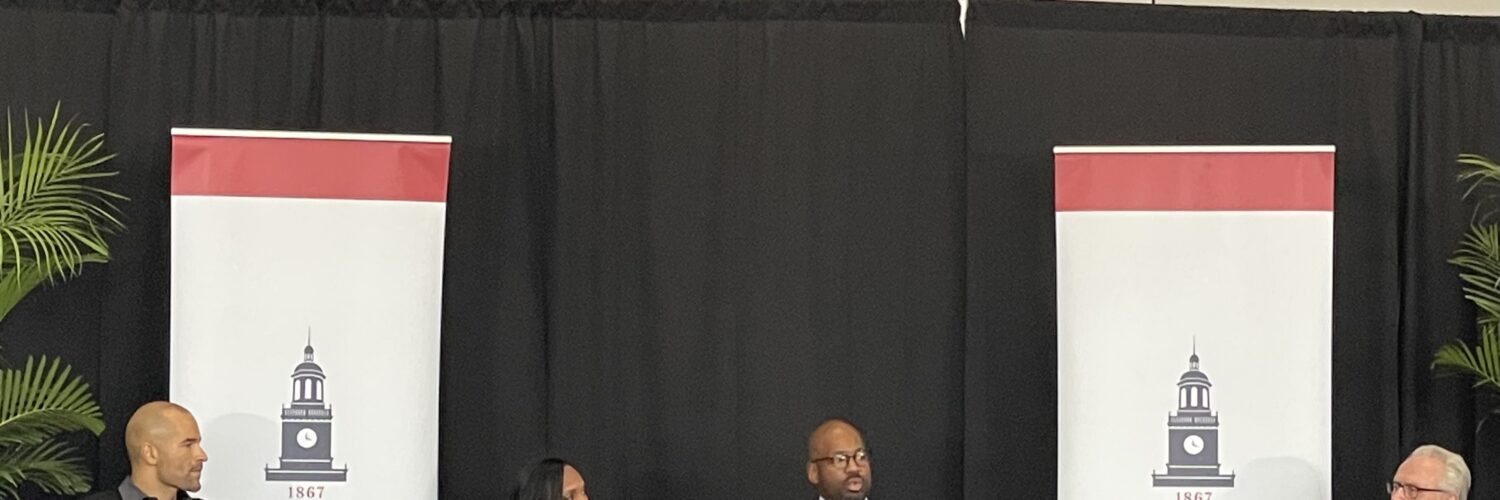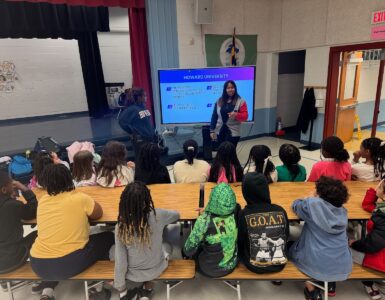
The Office of Student Affairs welcomed CNN and Warner Brothers Discovery (WBD) Sports to host a ‘Career and Conversations’ town hall in the Blackburn Ballroom on Monday, Feb. 5.
In the latest segment of Howard chat, renowned journalist and reporter Wolf Blitzer–alongside a panel of guest speakers from CNN and WBD Sports–engaged in a career-based discussion on journalism, with a second portion dedicated to a few students’ mentalities with the upcoming 2024 election.
All eyes rested ahead as Blitzer took to the stage. Listeners sat in anticipation. The sounds of camera shutters and recording devices scattered the capacious room. Eager reporters, students, and simple observers immediately quieted down.
He kicked off the event with enthusiasm as he welcomed the accomplished panelists to the stage: CNN correspondent Stephanie Elam; CNN news anchor Victor Blackwell; and WBD Senior Vice President and Creative Director, Drew Watkins. While the familiar faces on stage were exciting enough, the true beauty of the moment was the first-hand accounts of the day-to-day and overall experience of breaking news.
“A journalist’s brain does not work the same way. People think of network news, and it’s a very different game when you’re [actually] doing it. I park my car facing out all the time, I never let my gas tank below half of the tank,” Elam said. “All of these things, you’re constantly thinking about because you never know when an emergency is going to happen or when you’re going to be called out.”
The esteemed group of journalists holds communal ties going back to the HU Class of 1995. With a variety of journalistic endeavors sprawled between the three (Blitzer acted as a moderator for the majority of the session), the personal testimonies were inspired. Elam recalled some of the most refreshing moments from working with other Bison in the field while Watkins reminded the audience that in its early days, a career in journalism may seem impossible and unrewarding but perseverance is essential.
Regardless of their motivational journeys, a consistent theme of passion and resilience could be felt throughout the entirety of the discussion.
“What I love about my job is the acrobats of it. ‘Oh, we’re going to the President’, ‘Oh, there’s a verdict that just came in in one city, ‘There’s breaking news in another city’. To be able to move about those things quickly within two hours, the luxury,” Blackwell said. “I get to bring all those things to people. That’s what I love about the weekdays, to have the whole world awake, and at any moment, something can happen.”
The notable alumni were happy to give props to the Bison experiences that helped make their mark. The Blackburn Ballroom, in particular, evoked pleasant memories for Watkins as he recounted two groundbreaking moments of his journalistic career–both of which he accredits Howard for, and one of which happened 25 years ago in that very room.
As Watkins put it, two separate three-minute conversations landed him the opportunities of his first sports internship at WTTG, and his first post-grad gig working for ESPN: “Those two things happened at and because of Howard University. To be sitting in this room almost exactly 25 years later–and that spot, right where you’re sitting, that’s where the booth was. I’ve been thinking about it the entire time. It’s just so amazing. You are in the real world now; the interactions you’re having right now could guide your life in ways that you would never imagine. Don’t wait to establish yourself–do it today.”
In a surprising twist, a bulk of the panel’s discussion was rooted in unpacking how journalists protect their mental health on and off the clock. It’s no secret that, like other professions, journalists can be exposed to a plethora of trials and trauma as a basic part of their job description. Oftentimes, as Elam humorously mentioned, a simple phone call could mean traveling hours away to cover breaking news in unpredictable scenarios.
With the amount of societal pressure that is on journalists to report all news in a timely manner, the job can often be hectic and overwhelming. As Blitzer simply put it: “The new comes first”.
Blackwell briefly touched on how the application of boundaries in his work life has allowed him to maintain his own experiences and dealings, especially in the heap of racial distress happening in the world. On a similar note, Watkins shared how he has to discipline himself to not give into a negative cycle of over-sharing the more stressful moments of his day.
“In my personal life, a lot of my conversations with family and friends would be dedicated to these unimportant anxiety-inducing things. In a lot of ways, it contaminated the separation,” said Watkins. “So I’ve made it a point to unburden myself and unburden those impulses with the small things that I can just handle. I can have those moments and I don’t find myself at home having two hours’ worth of conversations, reliving the things that I was doing at work.”
With the first half of the town hall being dedicated to inspiring young journalists, the second half was an opportunity for participants to witness a CNN table talk live. Blackwell sat down with graduating seniors Zian Lane, Chase Drewery, and Student Government Association (SGA) President Jordyn Allen to reflect on the status of youth in politics, and get the ground running on some hot topics pertaining to the upcoming presidential election, with campaigning season just underway.
While each held their individual values and priorities, the level of poise and confidence radiating from the students was notable. The members spoke highly of the impact that the Bison community has had on their relationship(s) with politics, and fellow Bison Blackwell carried on with the intriguing questions that forced the speakers to talk and the audience to listen.
In reference to her time at Howard and in SGA, Allen believes the political climate on campus has helped her to become more engaged and strategic in politics, citing specifically how she learned to engage with her constituents and lobby votes while running for office. “Howard has really prepared me to have thoughtful and thought-provoking political conversations. I’m very grateful for Howard–I like to call it a simulation. It’s a simulation of what the real world is like, specifically for politics, but also for just academics and how the real world looks.”
Blitzer ended the night with his best piece of advice for journalists: practice, practice, practice; and follow your passion. Much like the other panelists, he emphasized the importance of being passionate about whatever field you study and being dedicated to the journey. Although these industry veterans contributed to the event in their own ways, one thing they could all agree on was that Howard was the place to excel in any career path.
“This is the difference here at Howard. [Being in D.C.] you have the world at your fingertips here. You’re building your network right now,” Elam said. “It’s magical; Howard is magic.”










Recent Comments